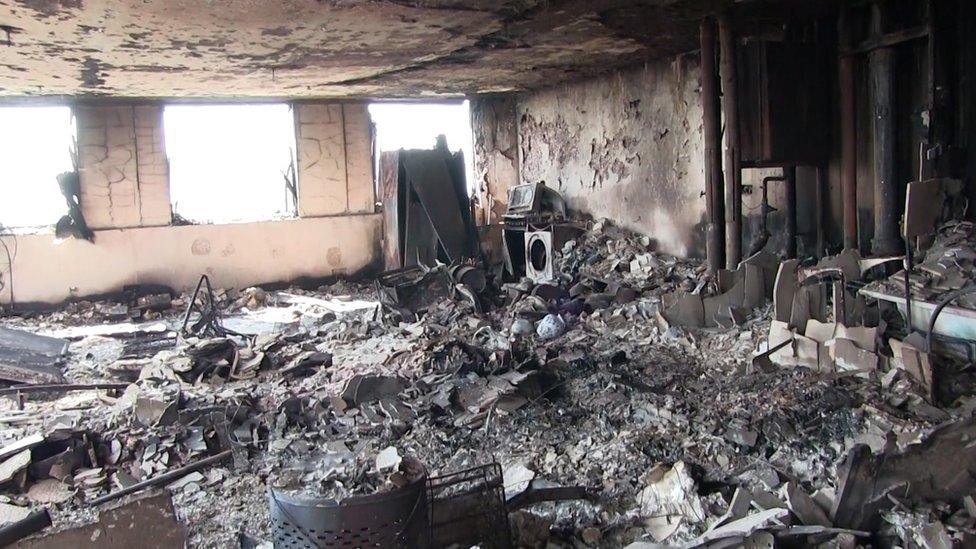No final Grenfell Tower death toll this year, police say
- Published
Many Grenfell residents told the housing minister they wanted "actions before words"
The final Grenfell Tower fire toll will not be known until at least the end of the year, with 80 people currently presumed dead, police have said.
Most of those who died in the 14 June blaze were said to be in 23 of the North Kensington building's 129 flats.
Police are tracing victims via "every imaginable source" of information; from government agencies to fast food firms.
The opening of inquests into seven of the victims heard a six-month-old baby was found dead in her mother's arms.
Survivors and relatives of those who died have expressed frustration at the progress of the investigation.
But Det Supt Fiona McCormack said the full death toll would only be known when the search and recovery operation and identification process was over.
"What I can say is that we believe that around 80 people are either dead or sadly missing and I must presume that they are dead," the officer said.
She added: "I don't want there to be any hidden victims. We want to understand the true human cost of this tragedy."
The previously given death toll from the fire was 79.
The Metropolitan Police announcement came as Prime Minister Theresa May told MPs that cladding from 120 high-rise buildings in 37 local authority areas in England has now failed fire safety tests.
Mrs May rejected Labour leader Jeremy Corbyn's claim that the fire was the result of fewer building control inspectors and "the disastrous effect of austerity", saying the cladding of tower blocks was an issue that had "developed over decades" under successive governments and councils.
In the update to the investigation, police said:
Some residents had tried to move up the building to escape the flames and it is thought a number of people may have ended up in one flat
The 23 flats where most victims are believed to have died were located between the 11th and 23rd floors - and the fire service received 26 calls from residents there
There was "utter devastation inside the flats," with a few homes still in too unsafe a condition to carry out further investigations
More than 60 "companies and organisations" played a role in the refurbishment of Grenfell Tower - work that is believed to have helped aid the spread of the fire
Police said "it would have been impossible for anyone to produce a list before that showed exactly who was in Grenfell Tower that night - that includes those people living there but also those visiting".
"What I can tell you is there are 129 flats inside Grenfell Tower. We, the police, have spoken to at least one occupant of 106 of those 129 flats," Det Supt McCormack said.
"These people have been able to tell us not just who lived in those flats, but importantly who was in those flats on the night."
The officer said 18 people connected to those 106 flats are dead or missing presumed dead but "it is a terrible reality that there are 23 flats where despite huge investigative efforts, we have been unable to trace anyone alive who lived there.
"At this stage, we must presume, that no-one in those 23 flats survived, that includes anyone who lived there or was visiting them."
Det Supt McCormack said officers were having to prepare some families for the reality that their relatives' remains may never be recovered.

Westminster coroner Dr Fiona Wilcox opened and adjourned more inquests into the deaths of victims, including baby Leena Belkadi and her sister Malak, aged eight.
Leena, who died from inhalation of fire fumes, was found with her mother in a stairwell between the 19th and 20th floor. The inquests into the deaths of the girl's parents - Farah Hamdan and Omar Belkadi - were opened earlier.
The other inquests to opened included that of Syrian refugee Mohammed Al Haj Ali, 23, who was the first fatality to be formally identified by police. He had been previously named as Mohammad Alhajali.
Oluwaseun Talabi talked about his survival as he revisited the tower, two weeks on
Local people have created their own databases on missing people with figures which differ from those officially released.
Police say they hoped information would be sent to its investigation if it might help to identify the missing.
Meanwhile, a number of Grenfell Tower residents confronted housing minister Alok Sharma MP on why the homeless are not yet rehoused, in tense exchanges on the BBC's Victoria Derbyshire programme.
Many said they had not been able to sleep since the disaster, or were haunted by images of their escape and their friends, family and neighbours who perished.
The fire destroyed 151 homes, most in the tower block, but also a number of surrounding properties. Mr Sharma said the government guaranteed people who had had their homes destroyed would be offered suitable temporary accommodation within three weeks.
But Mahad Egal, who escaped the fourth floor of Grenfell Tower, told the programme he refused the offer of alternative accommodation in a high rise block for his family.
Oluwaseun Talabi, said he had lost everything and was living with his wife and young daughter in a hotel room.
"I am not going to take any house you give me, it has to be suitable," he said. "I was happy in my house. I work hard. I want permanent accommodation."

Are you affected by the issues raised in this story? Let us know by emailing haveyoursay@bbc.co.uk, external
You can also contact us in the following ways:
Tweet: @BBC_HaveYourSay, external
WhatsApp: +447555 173285
Text an SMS or MMS to 61124 (UK) or +44 7624 800 100 (international)
Please read our terms & conditions